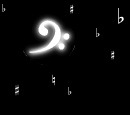
Dan Cragan Music
Transcriptions, Arrangements, Music Copyist,
Film and Media Composer
Transcriptions

Playing by ear is one thing, but sometimes you need a written score that someone else can play from. Music transcriptions are scores produced by listening carefully to a recording, writing down all the notes or chords, and formatting it into a readable score. This can help musicians of all levels who play their own songs, but find it difficult to write them down in proper notation for someone else to play. Music transcriptions can be done in a variety of formats:
- Lead Sheets - One-line melody with lyrics and chord symbols
- Sheet Music - One-line melody with lyrics, chord symbols and an easy piano arrangement containing the melody
- Full Arrangement - All lines and instruments written out exactly as played. This can contain other instruments besides piano.
- Any other format you desire
All I need is a recording clear enough to hear all voices singing and instruments playing.
Score Preparation
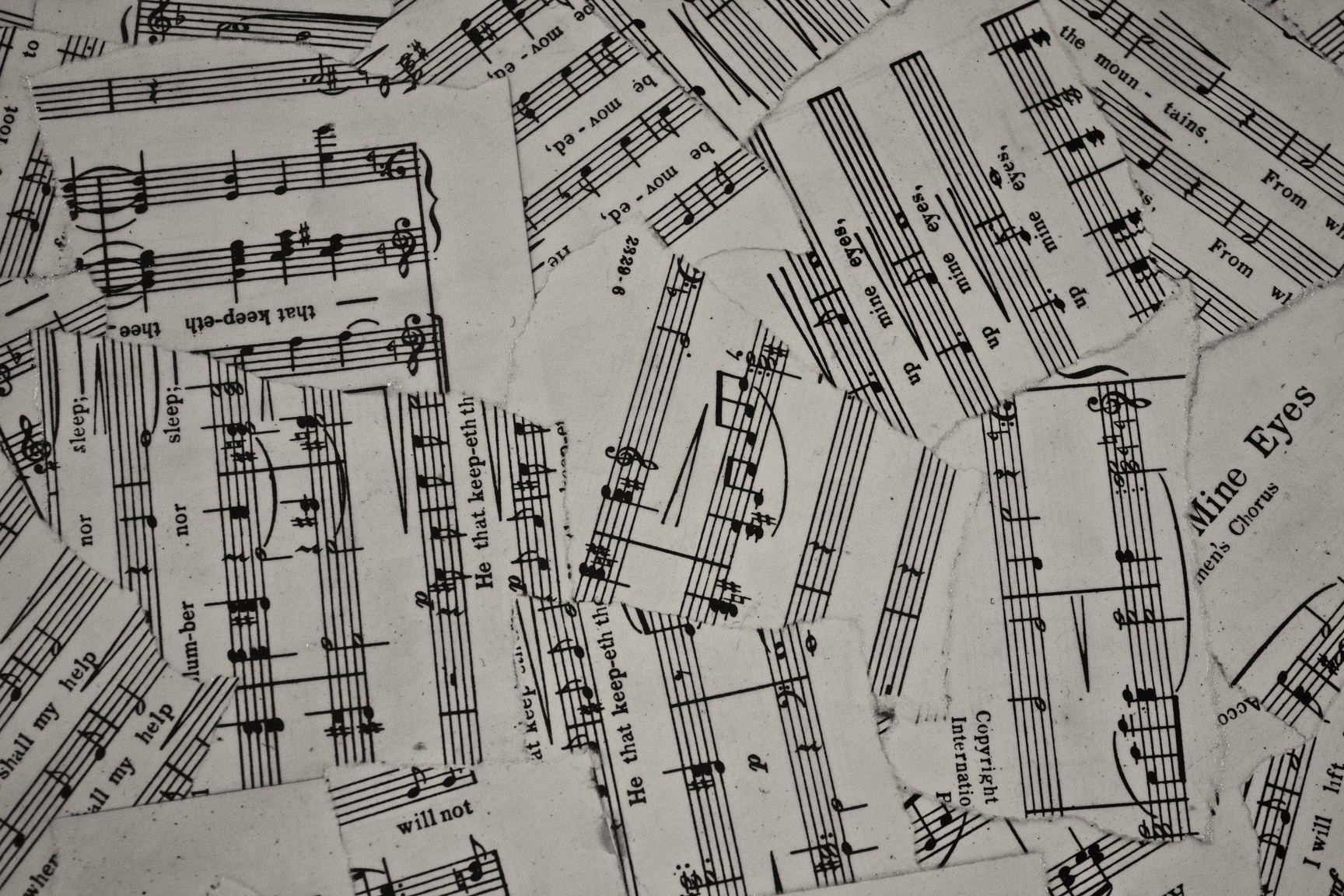
Printed scores from manuscripts | Part extraction Transpose to a different key | Scores from MIDI files
Why use a music copyist?
when there are plenty of music scoring programs around?
Because you are not just paying for pretty notes. You are paying for expertise. Proper music notation has rules, exceptions to those rules, rules for those exceptions, exceptions to the exceptions... well, you get the idea. Musicians will know if a score ignores the rules because it becomes hard to read and just doesn't "look right." A good music copyist can fix that and keep your musicians happy..
User-friendly scores
All scores are produced with the performing musician in mind. This means that where possible, page breaks are put in convenient places, and the entire score is designed to reduce eye-clutter and be readily understandable. Happy musicians always play better.
Arrangements

Your score calls for 4-part chorus with full brass choir, and you've got a piano, 2 singers and a tuba.
No problem.
That piano piece would sound great with a string quartet, but nobody's ever done it that way.
No problem.
Believe it or not, I was once asked to score the closing theme from the movie "Top Gun" for a handbell choir. Believe it or not, it worked! The point is, no request is unthinkable. While your project may not be quite that dramatic, it can probably be done one way or another.
Just let me know what you've got in mind.
MIDI vs. Audio
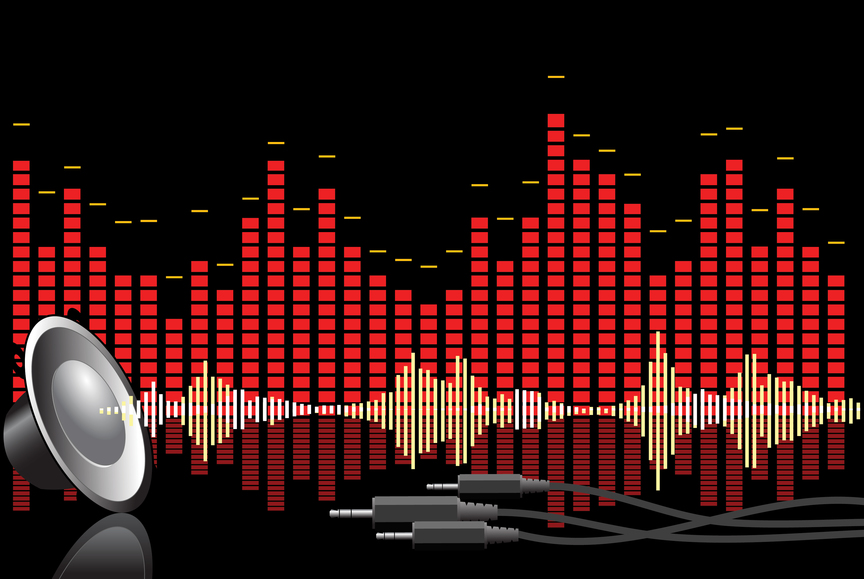
MIDI
MIDI files contain no sound. Repeat, MIDI files contain no sound! They contain only performance data.
Piano Rolls
In years gone by, player pianos played music by "reading" holes punched in a roll of paper. You could hold that paper to your ear all day long and never hear any sound from it. That's because the paper was only a conveyor of information. It told the piano what notes to play, but the piano did the actual playing.
MIDI files are the piano rolls of the electronic age. They contain no sound, but tell the computer or electronic keyboard what to play.
For Example:
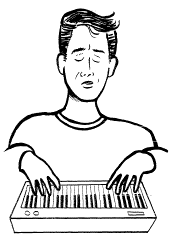
Imagine a guy playing your favorite song on a keyboard. By pressing the keys, he's "telling" the keyboard what notes to play and how long to play them.
Now imagine the guy being replaced by a computer. The computer sends signals to the keyboard that tell it what notes to play and how long to play them. These are MIDI signals.
Now imagine the keyboard being replaced by your computer's sound card. When playing MIDI, a sound card is acting like a little keyboard in your computer. The MIDI file is "telling" it what to play.
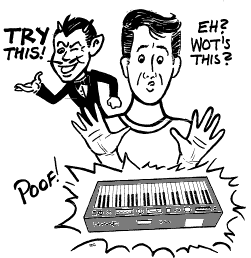 Now imagine someone taking the guy's keyboard away and replacing it with a different model. This new one might have a better or worse sound than the first one. Likewise, a MIDI file will sound a little bit different when played on another person's sound module. It just depends on what kind of module he or she has.
Now imagine someone taking the guy's keyboard away and replacing it with a different model. This new one might have a better or worse sound than the first one. Likewise, a MIDI file will sound a little bit different when played on another person's sound module. It just depends on what kind of module he or she has.
Advantages of MIDI files
MIDI files are tiny, often 10K or less. Even in large numbers, they use virtually no storage space.
Disadvantages of MIDI files
MIDI files were once used as a simple way to stream music through web sites, but because they sound a little different when played on different machines, there was no guarantee that those lush horns wouldn't sound like blaring trumpets on the next guy's machine. Today, MIDI files are mostly used to play sound modules or auido samples, which are then recorded to audio files for consistent playback.
Digital Audio
Digital audio files are high-quality sound recordings. They store every yelp, screech and caterwaul exactly as you make it, then reproduce them accurately on playback, no matter what kind of machine they are played on.
Advantages of audio files
Like I said, they reproduce exact sounds, including all yelps, screeches and caterwauls.
Disadvantages of audio files
They are HUGE! They can take up 10MB or more per minute of sound. Even with high-speed Internet connections, a raw audio file can take several minutes to download.
On the web, audio files are best used as streaming media, where the user listens to a selection as it comes down, saving the trouble of waiting for a long download. Even so, the size of these files, especially when combined with video, can cause problems.
What About MP3?
MP3 is an audio format which takes all the frequencies only your dog or your pet elephant could hear and removes them. It also removes certain background sounds that you could hear, but would probably not be aware of. Then it compresses what's left, much like other files are "zipped," for faster download.
MP3 is an attempt to combine the small size of MIDI files with the high quality of other audio formats. The quality of MP3 files makes some recording engineers balk, and they are still larger than MIDI files, but they provide a good compromise that most people are happy with. That's why they are the most popular choice for casual listening.
Illustrastions by Roger Caldwell
About Me

- Certificate in Film and Television Scoring - University of California, Los Angeles
- Graduate of the BMI-Lehman Engle Musical Theatre Workshop, New York
- Playwrights Horizons Theatre School, New York - Musical Theatre composition
- Bachelor of Music in Music Composition and Theory, University of Tennessee. Traditional and electronic music
Contact
Dan Cragan
123 Pueblo Lane.
Topanga, CA 90290
